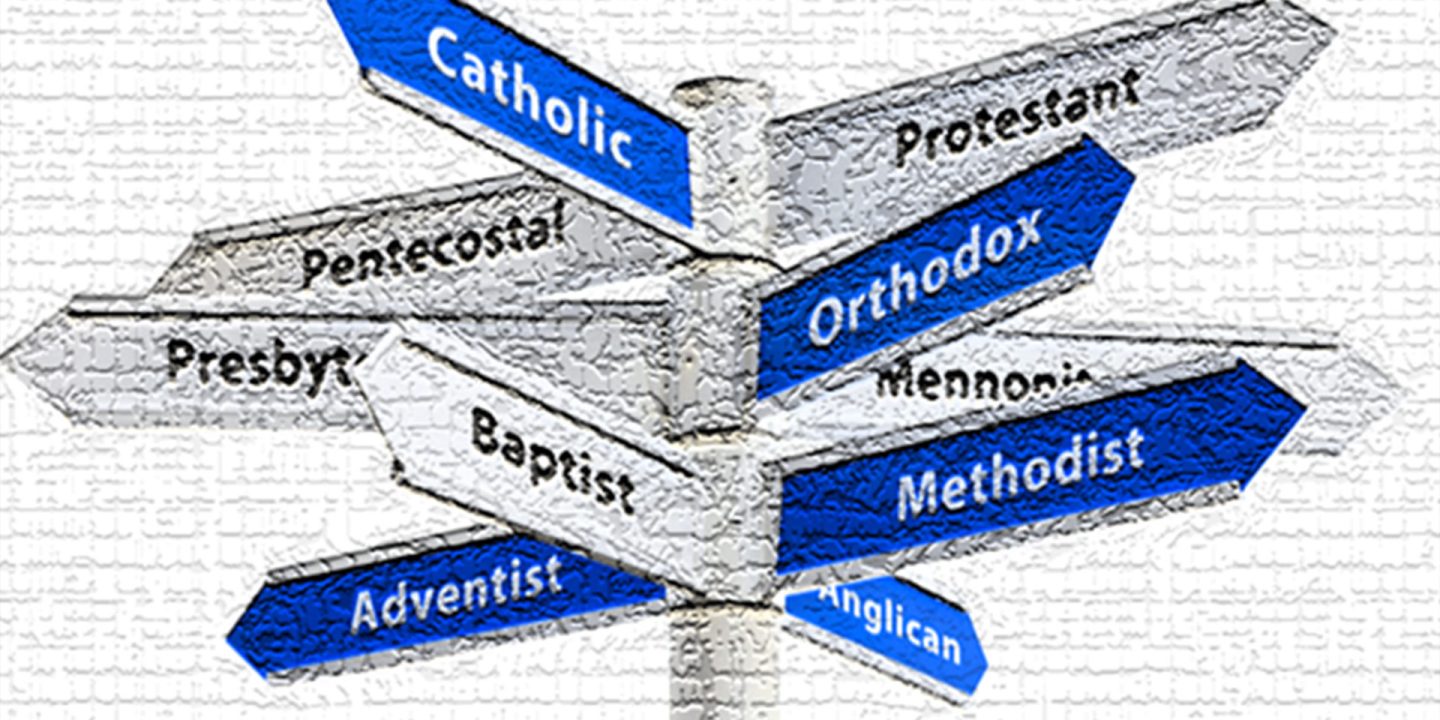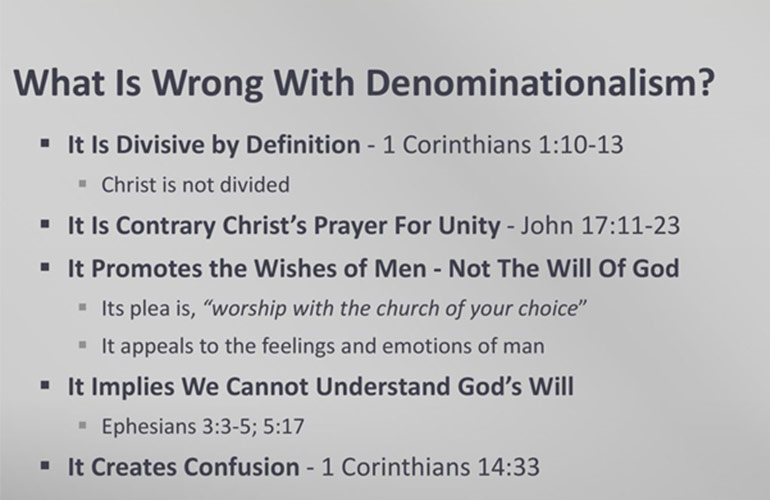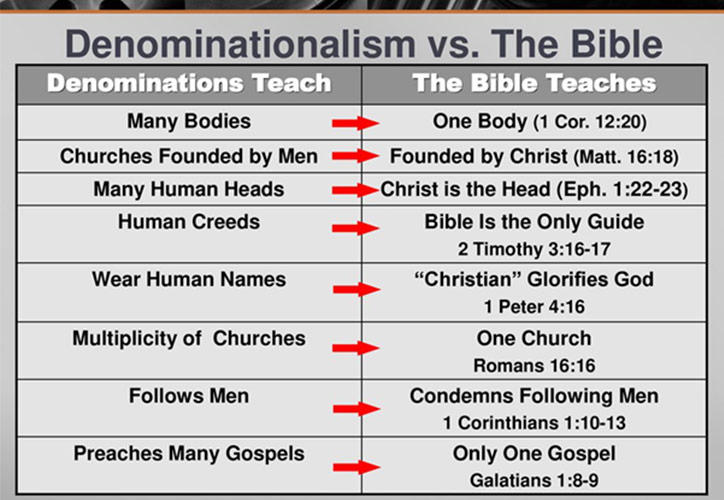- Home
- Christian News + Features
- Is Denominationalism Scriptura ...

Is Denominationalism Scriptural? When I got born again newly, I had this desire to fellowship with believers in a small setting. By then, I had not read 1 Corinthians 14:26 where Paul the apostle gave the prototype of the church. That Scripture reads, “What is it then, brethren? When ye come together, each one hath a psalm, hath a teaching, hath a revelation, hath a tongue, hath an interpretation. Let all things be done unto edifying.”
Of course, I did not find such a gathering of believers until my quest for God took me to many denominations where I learned Christianese. God had mercy on me, by linking me up with a group called the “Called Out”, which operates like the New Testament church Paul referred to in the cited Scripture.
Sadly, many Christians have not had the benefit of enjoying real fellowship with each other and with God, as explained in 1 John 1:3-10. They have been nurtured in the divisive waters of manmade church traditions inherited from Roman Catholicism.
It is instructive to note that Jesus Christ did not preach church attendance, nor did He present the Kingdom of God as something synonymous with church attendance. In fact, no believer in the New Testament “attended church,” because the church was then defined as the community of believers. This community, known as the body of Christ, was blessed with many gifts by the Holy Spirit, and each member was to act as a joint that supplies nourishment to the entire body (Ephesians 4:16).
This was the state of the church before Rome captured it and took it in a different direction incorporating many pagan rituals and practices. It was in Rome that the church of Christ, the community of believers, was replaced with temples or cathedrals.
Why did believers accept this imposition despite Paul’s declaration that the God who made heaven and earth does not dwell in manmade temples? (Acts 17:24-28). It is pertinent to note that the tabernacle Moses built in the wilderness was according to the revelation God gave him on Mount Horeb (Exodus 25:40). Solomon used the same pattern to build the first Temple in Jerusalem.
With the entry of Roman Catholicism came pagan rituals and unscriptural doctrines like “purgatory” (the idea that the blood of Jesus Christ is not enough to cleanse our souls), the veneration (worship) of “Mary” and other dead people and payment of indulgence. The indulgence part of the Catholic theology provoked the Reformation led by Martin Luther.
Unfortunately, Luther and his followers did not return the church to its original state, but continued with the form introduced by Rome, which portrayed it as a building. Some Lutherans, as followers of Luther were called, later broke away to form the ‘Baptist Church,” and the split continued as other disenchanted members found new niches outside its fold. Briefly, this is the history of denominationalism in Christendom.

So, what does the word “denomination” mean? According to Cambridge online Dictionary, it refers to a religious group that has slightly different beliefs from other groups that share the same religion. It is actually a glamorous word for “division.” What does Scripture say about division in the body of Christ?
In 1 Corinthians 1:1-12, Paul condemned divisions within the church, as some had aligned themselves with the various leaders, including Paul himself, Peter, Apollos, and even the Lord Jesus Christ. He said in verse 10, “Now I beseech you, brethren, by the name of our Lord Jesus Christ, that ye all speak the same thing, and that there be no divisions among you; but that ye be perfectly joined together in the same mind and in the same judgement.”

Clearly, we can see that denomination is unscriptural and a weapon by the enemy to weaken the church. The Lord Himself said in Matthew 12:25, “Every kingdom divided against itself is laid waste, and no city or house divided against itself will stand.” We can now understand why the institutional church has lost its power to transform the world; and is rather a playground of demons promoting all sorts of ungodly teachings and human philosophies. Many of the denominations have also adopted conflicting stance on some Biblical doctrines as follows:
i. Baptism: The Catholic Church sprinkles water on members during baptism, as opposed to immersion, symbolic of death and resurrection (Matthew 3:13-16Romans 6:2-11; 1 Corinthians 15:31; Colossians 2:12; 1 Peter 3:20-21);
ii. Scripture as the infallible word of God (2 Peter 1:20-21; 2 Timothy 3:16-17). Some denominations do not accept that the Bible is the written word of God. Many of them in the West, especially America insist that the Bible is inspired by God but that it is not the actual word of God.
Consequently, many of them do not accept certain Biblical truths such as the virgin birth of Christ or His physical resurrection from the death. The Catholic Church is the worse culprit on this score because it dismisses much of the Old Testament as “Jewish myths.” In addition, the church describes the first 11 chapters of Genesis as fiction, along with the burning bush story in Exodus 3:2-5;
iii. Operations of the Holy Spirit – Many denominations, especially those in the orthodox fold do not accept operations of the Holy Spirit. These groups collectively known as Cessationists, insists that the Holy Spirit does not give His gifts to believers in our generation, because according to them, He ceased working in the church after the first century AD. Obviously, these folks unabashedly call Jesus Christ a liar. He said in Mark 16:17-18, “And these signs shall follow them that believe: In My name shall they cast out devils; they shall speak with new tongues;
They shall take up serpent; and if they drink any deadly thing, it shall not hurt them; they shall lay hands on the sick, and they shall recover. The Cessationists equally despise Peter’s claims on the Day of Pentecost that the promise God made in Joel 2:28 to pour out the Holy Spirit on all flesh is for those present, their children and as many as the Lord would call (Acts 2:39);
iv. Christian fellowship – Paul specified the order of Christian fellowship in 1 Corinthians 14:26, which is essentially a horizontal relationship among members, and a vertical relationship with God. There is no provision for clergy and laity, in which certain people are ordained to preach and others are passive participants.
Every member of the body of Christ has a role to play depending on the gift he or she received from the Holy Spirit. In most denominations, the Pastor handles all the roles that should be performed by the entire body. Most of us have either forgotten or choose to ignore Jesus’ declaration that we are all brethren, and should therefore not focus our attention on supposed “spiritual giants” (Matthew 23:8); and
v. Days for congregational meetings – The early church met for fellowship on the first day of the Jewish week, which is Sunday (Acts 20:7; 1 Corinthians 16:1-2; John 20:19). Obviously, they did not meet on the Sabbath because its laws prohibited Jews from travelling beyond a certain distance on that day, specifically 6 p.m. on Friday to 6 p.m. on Saturday. This is what is referred to as “Sabbath day journey” (Exodus 16:29, Numbers 35:5; Acts 1:12).
However, a certain group of “Christians” known as the Seventh Day Adventists affirm that faith in Christ is based on their observance of the Sabbath as day for congregational meetings. The atoning sacrifice of Jesus does not mean anything to them at all. Thus, they describe believers who meet on Sundays as worshippers of the Roman sun god.
They do not realise that for the same reason, they are worshippers of the Roman god, Saturn, since Saturday is named after him! Under the New Covenant, Jesus said to the Samaritan woman in John 4:24 that God desires those who would worship Him in spirit and in truth. Thus, we are not under the law of Sabbath; but are called to worship God every day. This is what Paul said in Colossians 2:16-17, “Let no man therefore judge you in meat, or in drink, or in respect of an holyday, or of the new moon, or of the Sabbath days: Which are a shadow of things to come; but the body is of Christ.”
What then is the solution to denominationalism? There would be no major problem with the concept if all “churches” with their interesting labels preached the same truth and accepted all the teachings of the Holy Bible. Certainly, all Christians in the world cannot meet in the same building or in the same city, considering the geographical locations of all nation states. The solution lies in all believers making Jesus Christ the Lord of their lives indeed, and following the leading of the Holy Spirit.
When we take our eyes off our pastors, general oversees, or whatever titles men have given themselves, and focus solely on the Lord, He will order our steps to meet likeminded believers with whom we can fellowship as a church. The Holy Spirit is the only authorised Administrator of the church of Jesus Christ. Ask Him to help you worship God acceptably in a church setting that honours Him. No manmade building is the church of Christ.
